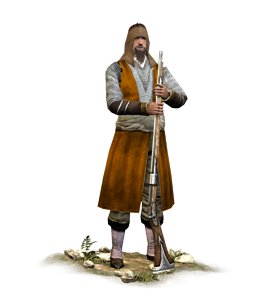Difference between revisions of "Bargir Infantry (ETW Unit)"
m (Adding Punjab) |
m (→Overview) |
||
| (One intermediate revision by one other user not shown) | |||
| Line 17: | Line 17: | ||
==Overview== | ==Overview== | ||
| − | With their equipment paid for by the state and their | + | With their equipment paid-for by the state, and their organization based upon tried-and-tested European principles, Bargir infantry are more reliable than most Indian foot soldiers. Armed with good muskets and often trained or led by mercenary European officers, Bargirs provide their general with a range of tactical options on the battlefield. |
| − | Traditionally, armies on the Indian subcontinent were geared toward mounted troops who enjoyed a high status compared to infantry. Footsoldiers, mainly drawn from the lowest echelons of society, were typically a | + | Traditionally, armies on the Indian subcontinent were geared toward mounted troops who enjoyed a high status compared to infantry. Footsoldiers, mainly drawn from the lowest echelons of society, were typically a disorganized rabble, useful to a commander only because they added numbers to an army. They were expendable, poorly-equipped and easily-dismayed in battle, often making them a liability rather than an asset. |
| − | The social mobility which | + | The social mobility which characterized Maratha society allowed a more modern view of the role of infantry to come to prevalence. Through observation of European methods, the equipment and training of Maratha infantry began to improve, allowing the successful use of advanced manouvers and firing drills. |
==Details== | ==Details== | ||
| Line 31: | Line 31: | ||
*[[Image:Punj_12.jpg|25px]] [[Punjab (ETW Faction)|Punjab]] | *[[Image:Punj_12.jpg|25px]] [[Punjab (ETW Faction)|Punjab]] | ||
| − | |||
[[Category:ETW Infantry]] | [[Category:ETW Infantry]] | ||
| + | [[Category:ETW Units]] | ||
Latest revision as of 08:51, 18 November 2024
 Heavily influenced by European military thinking, Bargirs are a match to most line infantry regiments.
Heavily influenced by European military thinking, Bargirs are a match to most line infantry regiments.
Overview
With their equipment paid-for by the state, and their organization based upon tried-and-tested European principles, Bargir infantry are more reliable than most Indian foot soldiers. Armed with good muskets and often trained or led by mercenary European officers, Bargirs provide their general with a range of tactical options on the battlefield.
Traditionally, armies on the Indian subcontinent were geared toward mounted troops who enjoyed a high status compared to infantry. Footsoldiers, mainly drawn from the lowest echelons of society, were typically a disorganized rabble, useful to a commander only because they added numbers to an army. They were expendable, poorly-equipped and easily-dismayed in battle, often making them a liability rather than an asset.
The social mobility which characterized Maratha society allowed a more modern view of the role of infantry to come to prevalence. Through observation of European methods, the equipment and training of Maratha infantry began to improve, allowing the successful use of advanced manouvers and firing drills.
Details
Bargir infantry are the Maratha equivalent of European line infantry. They possess slightly superior base statistics; however, in the early game they are no match for the specialized melee infantry and in the late game they cannot utilize Fire by Rank. Bargir Infantry should be used to combat enemy lines and should be expected to defeat an equally trained and equipped line. However, unless they are in Square Formation, they should avoid combating cavalry.
